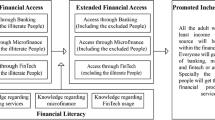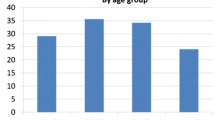Abstract
Against the backdrop of the rapidly expanding household debt in China, we have conducted this empirical analysis of the relationship between financial literacy and consumer debt. This paper focuses on the purpose of household borrowing, based on the data from Chinese Household Finance Survey (CHFS) data, and examines how exactly financial literacy affects actual household and consumer debt. This paper shows how financial literacy affects actual household debt accumulation and distribution. The main findings of the paper are as follows: (1) higher financial literacy is linked to household debt, but lower financial literacy correlates with excessive debt, which suggests that financial literacy helps households to rationally manage their assets, thereby effectively controlling household debt risk and reducing the risk of excessive debt. (2) Financial literacy has a strong positive impact on consumer debt, which has serious implications for the rapidly expanding household consumer finance market. Our study means that high level of financial literacy can push up consumer debt and in the process contribute to the expansion of the consumption market. Therefore, improving financial literacy can promote healthy borrowing behavior and reduce the risks associated with consumer finance and financial markets as a whole.
Access this chapter
Tax calculation will be finalised at checkout
Purchases are for personal use only
Similar content being viewed by others
References
Akudugu MA, Egyir IS, Mensah-Bonsu A (2009) Women farmers’ access to credit from rural banks in Ghana. Agric Fin Rev 69(3):284–299
Barnes, S. and Young, G. (2003), The rise in us household debt: assessing its causes and consequences, Bank of England Working Papers., No. 206.
Crook J (2001) The demand for household debt in the USA: evidence from the 1995 survey of consumer finance. Appl Fin Econ 11(1):83–91
Disney R, Gathergood J (2013) Financial literacy and consumer credit portfolios. J Bank Finan 37(7):2246–2254
Hung A, Parker A, Yoong J (2009) Defining and measuring financial literacy, Working Paper. Rand Corporation, Santa Monica
Huston SJ (2010) Measuring financial literacy. J Consum Aff 44(2):296–316
IMF (2018) A decade after the global financial crisis, are we safer? Global Financ Stab Rep, October
Kidwell B, Turrisi R (2004) An examination of college student money management tendencies. J Econ Psychol 25(5):601–616
Lombardi MJ, Mohanty M, Shim I (2017) The real effects of household debt in the short and long run. BIS Working Papers 607:1–42
Lusardi A, Mitchell OS (2007) Baby boomer retirement security: The roles of planning, financial literacy, and housing wealth. J Monet Econ 54(1):205–224
Lusardi A, Tufano P (2015) Debt literacy, financial experiences, and overindebtedness. J Pension Econ Fin 14(4):332–368
Lusardi A, Michaud PC, Mitchell OS (2017) Optimal financial knowledge and wealth inequality. J Polit Econ 125(2):431–477
Mian A, Sufi A, Verner E (2017) Household debt and business cycles worldwide. Q J Econ 132(4):1755–1817
Oseifuah EK (2010) Financial literacy and youth entrepreneurship in South Africa. Afr J Econ Manag Stud 1(2):164–182
Peng JC (2019) Research on financial literacy and household loan behavior: evidence from financial surveys in Chinese urban household consumption. J Xiangtan Univ (Philos Soc Sci) 1:125–129. (in Chinese)
Song QY, Wu Y, Yin ZC (2017) Financial literacy and household borrowing behavior. J Financ Res 6:95–110. (in Chinese)
Song QY, Xiao JN, Yin ZC (2019) The effect of financial literacy on household consumption. Econ Rev 1:113–147. (in Chinese)
Tian G, Huang X, Ning L, Wang Y (2018) Safeguarding household debt crisis and associated systemic financial risks, Policy Research Report No. 58. Shanghai Univ Fin Econ. (in Chinese)
Van Rooij M, Lusardi A, Alessie R (2011) Financial literacy and stock market participation. J Financ Econ 101(2):449–472
Wu, W.X., Xu, Q. and Bai, X.H. (2013), A comparative study of group differences among debt decision-making of Chinese households. (in Chinese).
Wu WX, Wu K, Wang J (2018) Financial literacy and household debt: empirical studies using Chinese household survey data. Econ Res J 1:97–109. (in Chinese)
Wu WX, Zhang XY, Wu K (2019) The effect of financial literacy on household debt behavior. Res Financ Econ Iss 5:57–65. (in Chinese)
Xiang H, Guo ZZ (2019) An empirical study of financial literacy’s impact on online lending consumption behavior: based on the mediating role of perceived risk. Consumption Econ 2:62–70. (in Chinese)
Yin ZC, Qiu H (2019) Is financial knowledge important for internet financial participation? Finance Trade Econ 6:70–84. (in Chinese)
Yin ZC, Song QY, Wu Y (2014) Financial literacy, trading experience and household portfolio choice. Econ Res J 1:62–75. (in Chinese)
Author information
Authors and Affiliations
Corresponding author
Editor information
Editors and Affiliations
Rights and permissions
Copyright information
© 2022 The Author(s), under exclusive license to Springer Nature Singapore Pte Ltd.
About this chapter
Cite this chapter
Tang, C. (2022). Financial Literacy and Consumer Debt: An Empirical Analysis Based on the CHFS Data. In: Kawano, M., Kourtit, K., Nijkamp, P., Higano, Y. (eds) Theory and History in Regional Perspective. New Frontiers in Regional Science: Asian Perspectives, vol 56. Springer, Singapore. https://doi.org/10.1007/978-981-16-6695-7_14
Download citation
DOI: https://doi.org/10.1007/978-981-16-6695-7_14
Published:
Publisher Name: Springer, Singapore
Print ISBN: 978-981-16-6694-0
Online ISBN: 978-981-16-6695-7
eBook Packages: Economics and FinanceEconomics and Finance (R0)




